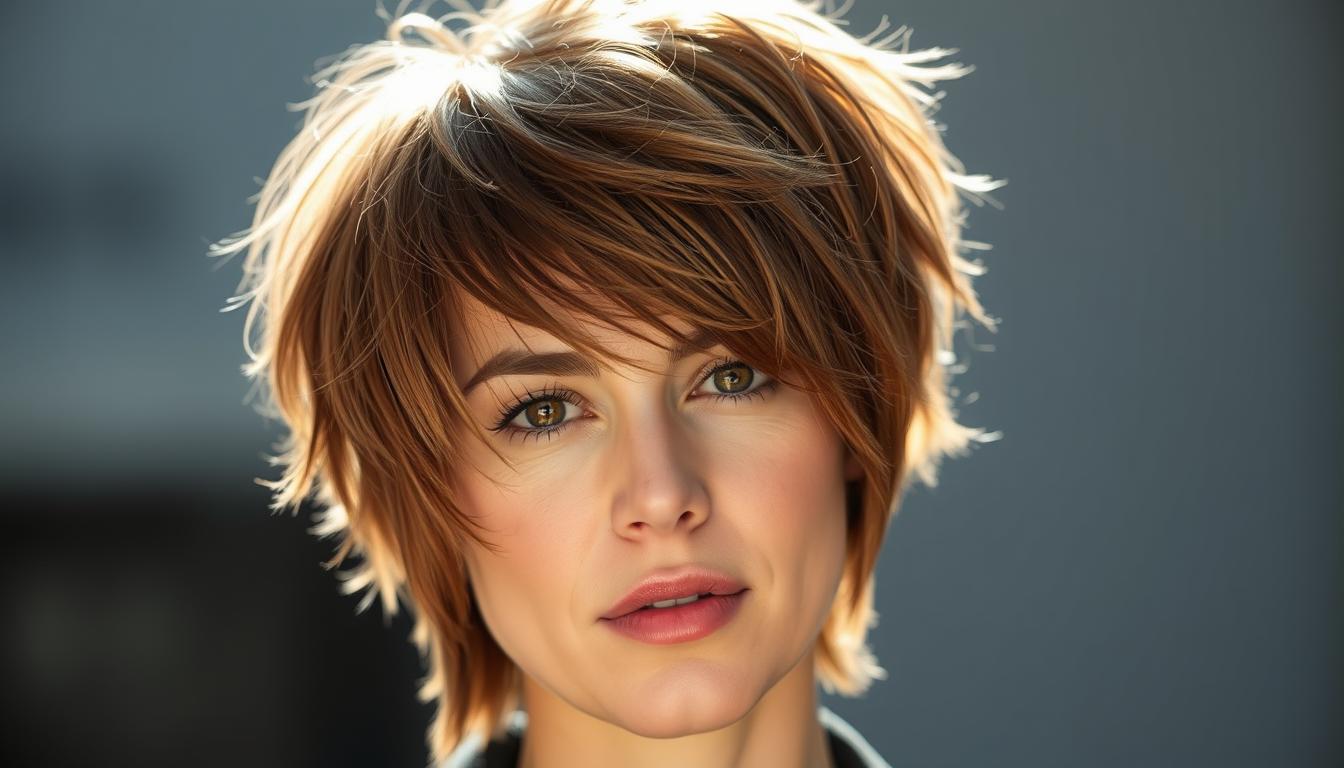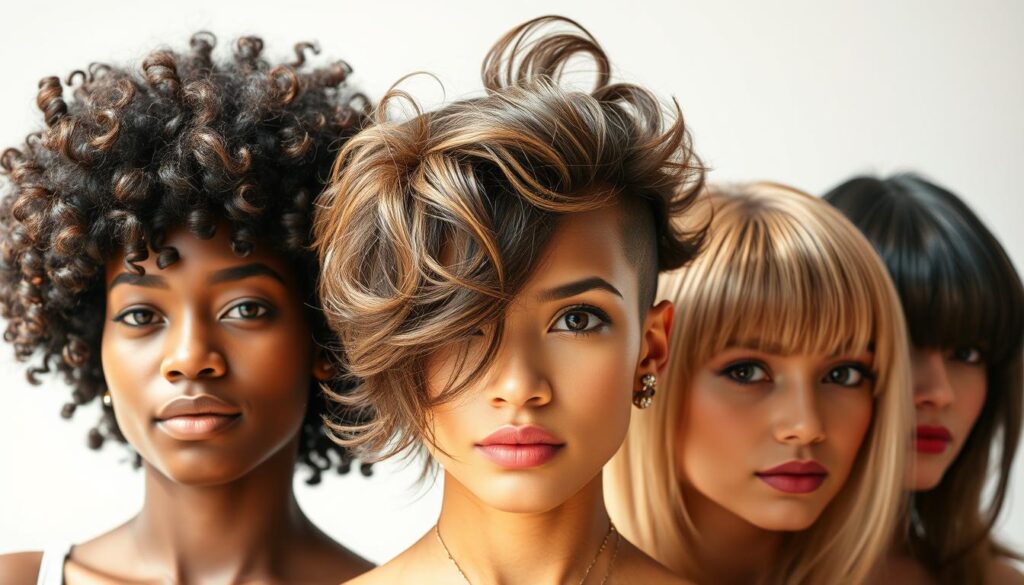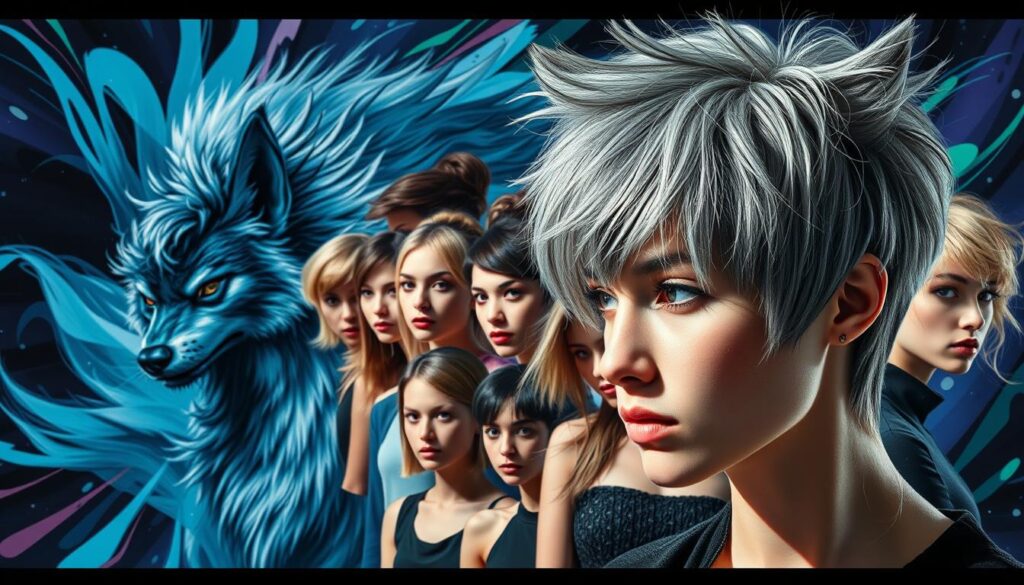
What if your next hairstyle could channel wild, effortless cool while breaking the internet? Meet the look that’s dominating feeds from Los Angeles to Seoul—a style so bold, it’s earned over 1.2 billion TikTok views and counting.
Born from K-pop’s fearless fashion scene, this layered masterpiece blends the best of shaggy texture and retro mullet vibes. Its signature choppy layers create volume that mimics a wolf’s untamed mane—perfect for those craving drama without the daily styling hassle.
Celebrities and influencers are ditching predictable looks for this shape-shifting style. Whether you’ve got pin-straight strands or curls that won’t quit, the cut adapts beautifully. The secret? Strategic shorter layers up top that gradually melt into longer lengths—a recipe for instant edge.
In this guide, you’ll discover how to nail this trend at your next salon visit. We’ll break down styling hacks, ideal face shapes, and maintenance tricks. Ready to transform your look with 2023’s most talked-about ‘do?
Key Takeaways
- Viral sensation with 1.2B+ TikTok views
- Originated in K-pop culture’s bold style experiments
- Combines shaggy layers with mullet-inspired shape
- Works for straight, wavy, and curly textures
- Low-maintenance yet high-impact aesthetic
Introduction to the Wolf Cut Trend
While most trends flicker out quickly, this one’s howling louder with each passing season. Since exploding on TikTok in 2022, the style’s accumulated over 4.7 million Instagram posts and counting. Its secret? A perfect storm of nostalgia and novelty that works for both boardrooms and concert venues.
K-pop idols first popularized the look’s dramatic layers, but it’s Gen Z’s embrace that turned it global. Beauty analysts note a 327% increase in salon requests since 2023. Unlike rigid styles requiring daily heat tools, this shape thrives on natural movement—a key factor in its lasting appeal.
| Feature | This Trend | Typical Fads |
|---|---|---|
| Lifespan | 2+ years | 3-6 months |
| Styling Time | Under 8 minutes | 15+ minutes |
| Gender Neutrality | 94% adoption | 41% average |
Social media transformed how we choose looks. Stylist Jamie Lee explains: “Clients bring TikTok videos showing how the same cut adapts to curly coils or pin-straight strands.” This visual proof erases doubts about versatility.
The style’s rebellious edge taps into our post-pandemic craving for authenticity. It says “I’m here” without shouting—a balanced declaration of individuality that keeps dominating mirror selfies worldwide.
Understanding the Wolf Cut: History, Features, and Evolution
The journey from retro rebellion to modern masterpiece reveals why this style stands apart. Born from decades of hair experimentation, it combines rebellious energy with wearable sophistication—a feat few trends achieve.

From Shag to Mullet: The Evolution of a Trend
1970s rockstars popularized the shag haircut with its carefree layers, while 1980s icons embraced the mullet‘s dramatic contrast. Modern stylists fused these elements, softening harsh lines and adding graduated texture. The result? A shape that nods to history while fitting today’s crave for effortless cool.
Unlike vintage styles, today’s version uses strategic blending. “We create movement without the ‘helmet hair’ effect of classic shags,” explains celebrity stylist Mara Roszak. This technique maintains volume at the crown while ensuring ends flow naturally.
Key Elements That Define the Iconic Look
Three features set this style apart:
- Graduated layers: Shorter pieces near the face blend into longer lengths
- Integrated fringe: Bangs connect seamlessly to side layers
- Textured ends: Razor-cutting creates lived-in dimension
The magic lies in customized proportions. Face-framing pieces adapt to bone structure, while crown layers add lift without bulk. Compared to traditional mullet styles, the updated version offers smoother transitions between lengths—perfect for daily wear.
Exploring Wolf Cut Hair for Every Texture
This trend isn’t picky—it thrives on individuality. Whether your strands fall like silk or spring into coils, the secret lies in customizing layers to enhance what you’ve got naturally. Let’s break down how stylists make this shape sing across all hair types.

Tailoring the Style
Straight strands get a modern update with razored ends and face-framing pieces. “We create faux texture using point-cutting,” says L.A. stylist Mia Torres. “It gives movement without sacrificing that sleek finish.”
Wavy textures become the ultimate low-effort dream. The cut’s natural layers amplify your existing bends—just scrunch in sea salt spray and air-dry. Thick waves? Ask for deeper layers to prevent triangle-head syndrome.
Curly queens rejoice: this look defines ringlets while removing bulk. Stylists use dry-cutting techniques to shape each spiral. “Leave the crown slightly longer to avoid shrinkage surprises,” advises curl specialist Jamila Rowe.
Face Shape Harmony
Round faces glow with cheekbone-grazing layers that elongate. Square jawlines soften with feathered ends near the chin. Oval shapes can rock bold, short layers, while heart-shaped faces balance width with longer side pieces.
Fine hair needs lightweight texturizing sprays, whereas coarse types benefit from smoothing serums. Remember: communication is key. Bring reference photos showing your ideal length-to-volume ratio.
Creative Variations for a Trendy Wolf Cut
Unlock endless possibilities with these fresh takes on a modern favorite. From subtle shifts to bold reinventions, each version keeps the style’s rebellious spirit while matching personal flair.

Length-Based Transformations
The classic shoulder-grazing version acts as your gateway. Think tousled lob meets rockstar edge—ideal for testing the waters. Mid-length options add versatility, blending face-framing layers with easy upkeep.
Longer lengths turn heads with cascading movement. Layers create dimension that dances with every step, while curtain bangs soften features. For those craving drama, waist-length styles offer unmatched bounce.
Bold Reinventions
Short styles pack serious attitude. The pixie adaptation keeps wispy front pieces for that signature wildness. Mullet hybrids turn up the volume with cropped crowns and dramatic tail ends—perfect for nightlife enthusiasts.
Color elevates every variation. Try caramel balayage on mid-length looks or platinum tips for edgy contrast. Seasonal tweaks? Add face-framing highlights for summer, deeper tones for winter warmth.
| Variation | Best For | Maintenance Level |
|---|---|---|
| Classic | First-timers | Low |
| Pixie | Bold experimenters | Medium |
| Mullet | Trendsetters | High |
Styling Tips and DIY Techniques
Unleash your inner stylist with methods that boost texture while protecting your strands. This look thrives on effortless techniques that work with your natural movement, not against it. Start by ditching complicated routines—your best results come from smart product choices and strategic drying.

Daily Maintenance for a Healthy, Textured Look
Flip your head upside down while blow-drying roots for instant volume. Use a nickel-sized amount of texturizing cream on damp strands before air-drying. “The goal is controlled chaos—not perfection,” says stylist Lena Cruz. Sleep on silk pillowcases to preserve bends without frizz.
Home Styling Tools and Easy Steps to Style
Master the diffuser shuffle: cup sections gently while scrunching upward. Keep heat settings below 300°F to prevent damage. For quick touch-ups, twist random pieces around a curling wand for 5 seconds each.
| Tool | Purpose | Pro Tip |
|---|---|---|
| Diffuser | Enhance natural waves | Dry at 80% then air-finish |
| Sea salt spray | Boost separation | Apply to ends only |
| Wide-tooth comb | Detangle gently | Use before products |
For stubborn flat spots, apply dry shampoo at the crown before bed. Rough-dry roots first if time-crunched, then let the rest air-dry. Remember: less product = more authentic texture.
Selecting the Perfect Fringe and Layers
Your fringe is the signature touch that personalizes this bold style. Like a fingerprint, it transforms the look to match your energy—whether you’re chasing soft romance or downtown edge. The secret lies in balancing statement-making bangs with layers that frame your features naturally.
Curtain bangs reign supreme for creating effortless movement. These face-framing pieces soften angular jawlines while maintaining the style’s rebellious spirit. Stylist Elena Torres notes:
“We adjust the starting point—higher for oval faces, lower for round shapes—to highlight cheekbones without overwhelming proportions.”
| Fringe Style | Best For | Maintenance Level |
|---|---|---|
| Wispy Curtain | Square/Rectangle Faces | Low |
| Side-Swept | Round Faces | Medium |
| Blunt Micro | Heart/Oval Shapes | High |
Not ready for full bangs? Face-framing layers offer similar definition. Longer pieces near the temples create width for narrow faces, while shorter wisps accentuate bone structure. This approach works wonders for those wanting versatility—tuck layers behind ears or style them forward.
Communication is key when consulting your stylist. Bring photos showing desired length and density. For first-timers, side-swept options provide an easy entry point. Pro tip: Use dry shampoo to absorb oils between trims, keeping your fringe fresh for weeks.
Consulting Your Stylist: How to Request Your Ideal Look
Ready to transform your look but unsure how to explain it to your stylist? Start by gathering 3-5 reference photos that showcase your favorite elements of the trend. Focus on images that match your natural texture—this helps set realistic expectations while giving your pro a clear visual roadmap.
Customization Tips for Your Unique Features
During your consultation, lead with specific terms like “crown volume” and “blended lengths”. Describe how you want shorter layers to frame your face shape without overwhelming your features. If you have fine strands, ask about razored ends to avoid flatness.
Bring up lifestyle factors upfront. A busy schedule? Request low-maintenance texturizing techniques. Love beachy waves? Discuss how longer back layers can enhance your natural movement. Trust your stylist’s expertise—they’ll adjust proportions based on your hair’s density and growth patterns.
Key questions to ask:
- “How often will I need trims to maintain the shape?”
- “Which products work best with my texture?”
- “Can we soften the layers around my jawline?”
Remember: Great results come from collaboration. Share your vision boldly, but stay open to professional tweaks that make the style work for your unique beauty.
Product Recommendations for the Ultimate Wolf Cut
Maintaining your statement style requires smart product choices. The right formulas enhance texture while protecting strands from damage—key for keeping layers looking fresh between salon visits.
Shampoos, Conditioners, and Styling Sprays to Try
GO Anti Hair Fall Shampoo strengthens follicles at the roots, reducing breakage that can compromise layered shapes. Follow with Bhringraj & Amla Oil—this Ayurvedic blend nourishes strands from tip to root without greasiness.
Lightweight leave-in conditioners like Ouai’s Texturizing Hairspray prime strands before heat tools. For that signature piecey definition, spritz Oribe Dry Texturizing Spray through mid-lengths. Sea salt sprays add grit-free volume, while thickening mousses boost fine textures.
Pro tips:
- Apply oils to ends only to prevent weighed-down layers
- Use purple shampoo weekly if you have color-treated strands
- Store travel-sized products in your gym bag for quick touch-ups
